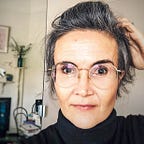Body Image Oppression
In a recent undergraduate Gender Studies class, we touched on the complex issue of ‘body image’. Despite the progress achieved in the pursuit of liberation, ‘body image’ is an issue that still seems to affect all women, no matter their age, culture, class, or religion. We need to have a long hard think about why that may be. Naomi Wolf claims in her book The Beauty Myth, written in 1990, that women face a continued form of repression under socially constructed ideas of feminine beauty; body-based oppression. Wolf points out that it is no coincidence that the establishment of the diet industry and the fashion trend to be thin coincided with Western women receiving the right to vote in the 1920s. The curvaceous female form gave way to the linear, thinner form of the liberated woman — the ‘flapper girl’. As the rights of women advanced; pushback on women’s bodies, surfaced. In our post-modern world restrictive, idealised beauty norms have become the current way of controlling women’s bodies and behaviour.
Western women are under relentless pressure to conform to an ideal body type, dictated by the media and popular culture. The trends and ideals change, from Twiggy or Kate Moss to Kim Kardashian, but the pressure remains the same. To better understand the power of that pressure, it helps to look at it through a Foucauldian lens. French philosopher, Michel Foucault, sees power as a relation present at every level of society. Power, in this sense, is enacted by expectations regarding women’s appearance, in a male-dominated society. Women, in turn, internalise these often-unreachable expectations in order to avoid shame and stigmatisation. This heightened state of discipline not only controls a woman’s body but affects her mind too. As Foucault puts it: ‘each becomes to themselves their own jailer’. In the battle to regulate women’s bodies, through pressure to conform, the body becomes a project or an object that can be controlled. Wolf claims that the ‘beauty myth’ is not about women at all, but about men and power.
Women have gained much ground in the battle for equality. However, women have also been sold an unachievable and diminished picture of beauty and femininity that threatens to restrict the liberation they have been fighting for. The more time women spend being distracted by what they can never be, the less time they have to spend on everything they are.
